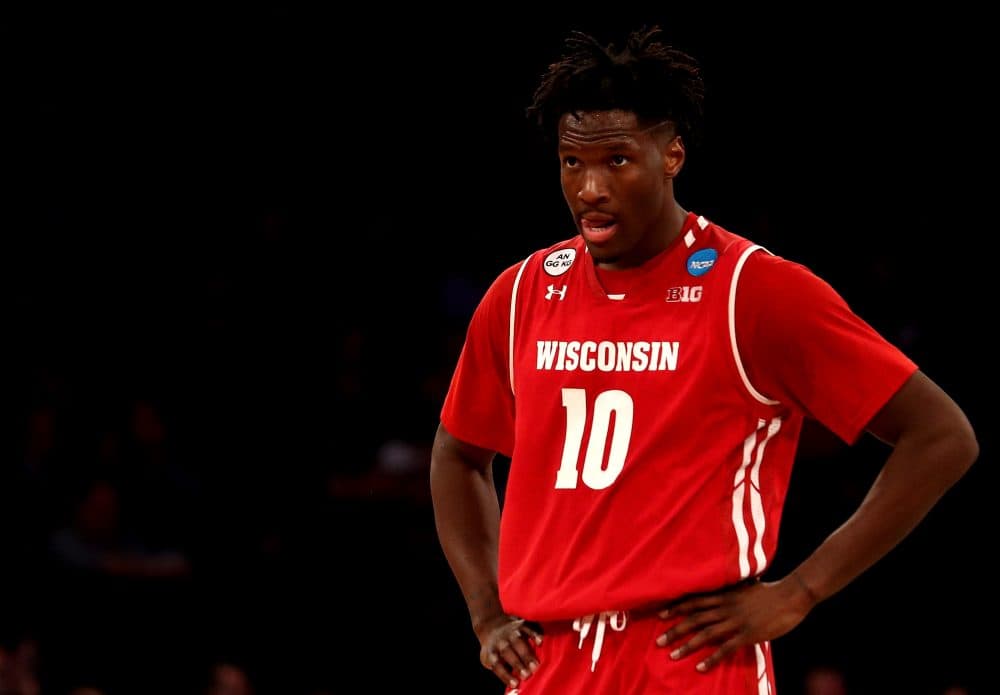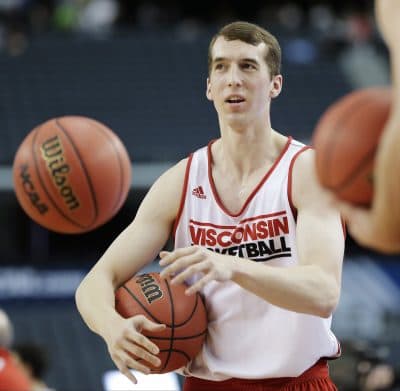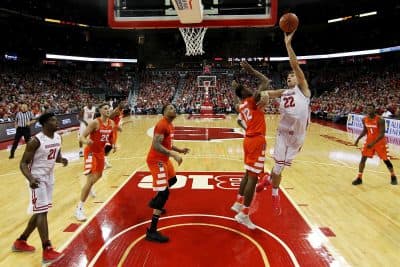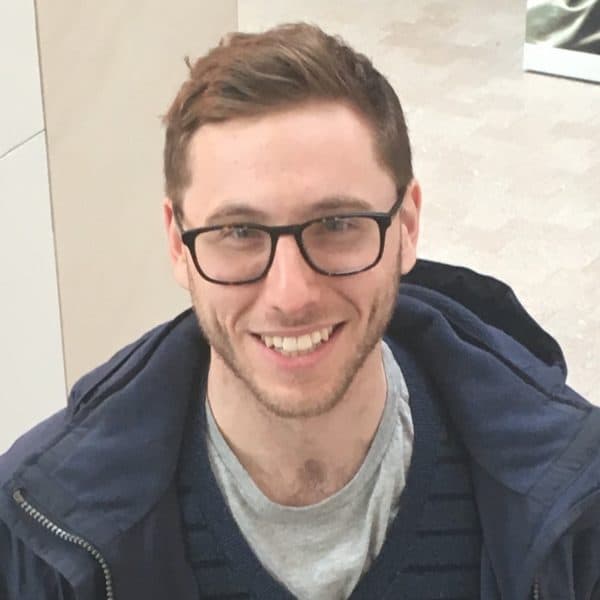Advertisement
NCAA Show
How Two Wisconsin Basketball Players Decided To Take On The NCAA
Resume
At the heart of this week's special episode about the NCAA is a simple question: Should college athletes be paid?
And I'm going to go out on a limb and guess that when a lot of our listeners hear that question, their gut reaction is: "No."
And I'm actually not going out on much of a limb — because studies show that the majority of Americans do not think college athletes should be paid. A 2014 poll from the Washington Post and ABC News found that about two in three Americans opposed paying college athletes.
And when basketball player Zach Bohannon transferred to the University of Wisconsin in 2011, he was like most Americans.
"I don't think students should be paid. That just sounds stupid to be point blank," Zach recalls.
That year Zach took a debate class.
"Communications 262," Zach says.
And for the final project, everyone had to debate a topic with a partner. Zach decided to argue against paying college athletes.
He came up with a lot of typical arguments: athletes are already being well-compensated with a scholarship, athletic departments shouldn't get any bigger, and college sports teach lessons that are priceless.
But then something happened that Zach didn't expect.
"The more and more research I was doing, the less and less it made sense," he says.
'It's Mind Boggling'
Zach was an economics major, and as he looked into the NCAA's business model, he became suspicious.
Zach realized that by agreeing to limit compensation to an athletic scholarship, colleges were essentially colluding to keep labor costs artificially low — which meant more money flowed to coaches and athletic departments.

"This revenue is so imbalanced," Zach says. "The director of compliance, who's literally just enforcing the rules by the NCAA, is making six figures off the backs of this unpaid labor. It's mind boggling."
Zach started noticing other ways that players seemed to be getting screwed. He and his teammates had to wear Adidas sneakers. Why? Not because they loved Adidas. But because the company was paying Wisconsin hundreds of thousands of dollars a year to turn its athletes into walking advertisements.
"They literally label us and brand us," Bohannon says. "And I was thinking, 'We don't see a dime of those endorsement deals.'"
(This kind of deal, by the way, is A-OK with the FBI and NCAA.)
As you can probably tell, Zach became passionate about this issue. He joined a group called the National College Players Association and became an expert on the NCAA.
But there were a couple things keeping Zach Bohannon from becoming the face of the opposition. For one, he was going to graduate soon. Two, he wasn't exactly a household name in college basketball.
Better would be a young, emerging star.
And that's when Zach met Nigel Hayes.
An Unexpected Ally
Nigel Hayes enrolled at Wisconsin in 2013. That was Zach Bohannon's final season with the Badgers, and he was hoping to get some more playing time.
But Nigel Hayes was a top recruit who played forward, just like Zach.
They did not get along.
"Yeah, I was not a fan of Zach Bohannon," Nigel says.
"Nigel came in as a cocky, wide-eyed freshman," Zach says.
And from the first scrimmages, Zach could tell Nigel was the better player.
"I remember sitting on the sidelines — I was like, 'This is not how my final year's supposed to go. I'm supposed to be playing,'" Zach recalls.
"So you could sorta see your playing time slipping away?" I ask
"Yeah, at that moment I did, which was sort of unfortunate to see."
As the season got going, Zach focused more on telling his teammates about the problems he was seeing with the NCAA.
And he found an unexpected ally.
"He was very intrigued by my opinions and he always kept asking, 'Well, what about this?' Or 'What about that?'" Zach says of Nigel. "And before it was all said and done, he was as well-versed in these topics as I was. And I was like, 'He's perfect. He's the right guy for this cause.'"
The Most Vocal Critic In Uniform
About three years later, with ESPN in Madison on the morning of a Wisconsin-Ohio State football game for its popular show "College GameDay," Nigel Hayes positioned himself in the crowd of cheering students.
He was holding a sign that read: "Broke College Athlete. Anything Helps." The image went viral.
Nigel was the real deal on the basketball court — he made First Team All-Big Ten as a junior — and he had also become the most vocal critic of the NCAA still in uniform.
"We're not 'student-athletes.' We came there to play a sport. I never saw one professor, I never saw an academic adviser come to my house, come to any of my high school games. So if I'm there for school, why weren't those people recruiting me to come there?"
Nigel Hayes
He wasn't afraid to say that it wasn't fair that he couldn't afford a plane ticket home for Thanksgiving while he was playing for a team that made millions for Wisconsin.
He wasn't afraid to say that the majority of elite basketball and football players were black while "their coaches all happen to be white and get paid millions."
And he wasn't afraid to say things like, "We're not 'student-athletes.' We came there to play a sport. I never saw one professor, I never saw an academic adviser come to my house, come to any of my high school games. So if I'm there for school, why weren't those people recruiting me to come there? But you know who I did see though? [Head coach] Bo [Ryan]. Bo was there. [Assistant] coach [Lamont] Paris, he was there. Those guys were there."
But unknown to almost everyone who saw Nigel's poster on that October morning or who read his tweets criticizing the NCAA business model, Nigel Hayes was hatching a much more ambitious plan to disrupt the NCAA: a boycott.
'Our Dream And The NCAA's Nightmare'
Zach Bohannon and Nigel Hayes certainly aren't the only college athletes who have tried to fight the NCAA.
There have been lawsuits. One recent highly publicized class-action lawsuit against the NCAA brought by former UCLA basketball star Ed O'Bannon claimed college athletes should be allowed to profit off their own name and likeness.
The courts mostly agreed with O’Bannon’s arguments but haven’t forced the NCAA to make major changes.
And then some of our listeners probably remember that the Northwestern football team tried to unionize a couple years back.
But the National Labor Relations Board essentially denied the team’s request.
But there's one idea a lot of people think could be a game changer — and that’s a boycott.
"Oh, my goodness — that's our dream and the NCAA's nightmare," the Washington Post's Kevin Blackistone says. "I cannot imagine what the reaction would be."
Nigel Hayes has known what a boycott could do.
"I think that that's really all it would take," he says.
And last year, Nigel decided he was going to try to lead the Wisconsin men's basketball team in a boycott.
"Someone has to be the one that sticks their neck out to bring the change," he says.
Nigel scanned the team's schedule. Refusing to play would mean forfeiting, so he wanted to find a game that would get attention but wouldn't hurt his team's chances to win the Big Ten conference.
One game stood out: On Nov. 29, Wisconsin would host nationally ranked Syracuse.
"We were on ESPN as well that night," Nigel says.
Nigel sent out a message to his teammates.
"'If I wanted to do this and sit out and not play, would you guys be willing?'" he recalls.
One teammate responded. It was a yes. Then another message came in. Another yes.

"I think four people had said yes in our group chat," Nigel says. "And then one was like, 'No.' So then it was like, all right, forget about it. If everyone's not on board than we're not going to do it."
"Looking back now, how do you feel about that?" I ask.
"I feel fine," he says. "It's the decision that the team wanted, so it's all right. I was still able to plant a seed. So just because I didn't do it doesn't mean, as Tupac said, you don't inspire the person who will change the world."
A New Lawsuit
Nigel graduated from Wisconsin in May and signed with the New York Knicks. But he could still play a direct role in changing the NCAA.
A couple years ago, Zach Bohannon was invited to sign onto a new class-action lawsuit against the NCAA. Zach did some research and realized this lawsuit was even bigger in scope than previous ones. It was being led by anti-trust lawyer Jeffrey Kessler — the guy who helped bring free agency to the NFL — and its goal was to take on the entire amateur model so that athletes can be paid.
But after being invited, Zach said, I can think of someone even better than me.
"So I approached Nigel the next day about the lawsuit," Zach says. "And literally — it was probably a 10 or 15 second conversation. He's like, 'Zach, do you think this is something I should do?' And I said, 'Absolutely.' And he goes, 'Even more important, do you think it's in the best interest of all student-athletes across the country?' I'm like, 'That's a no-brainer, Nigel.' He's like, 'I'm in.'"
Nigel Hayes was deposed in March 2015. The case is scheduled to go to trial next year.
And as for Nigel and Zach?
"We're really good buds," Nigel says. "You know, using the phrase 'iron sharpens iron' — we just see something in each other that we can both help and try to better ourselves."
This story is part of Only A Game's special episode about the past, present and future of the NCAA. Find the full episode here.
This segment aired on October 14, 2017.
